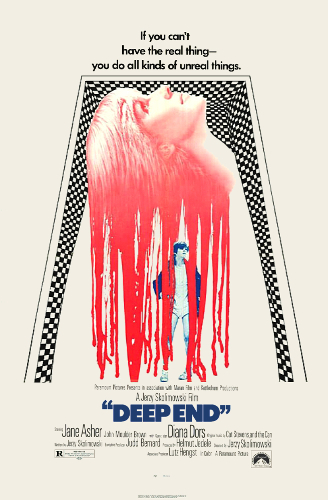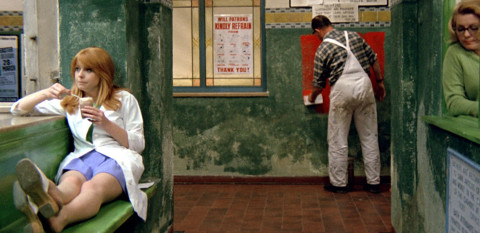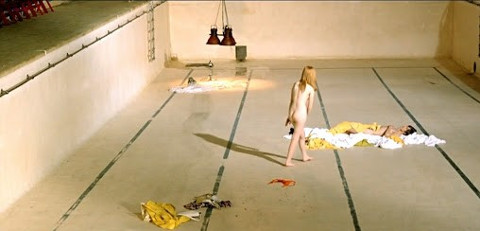Deep End (1970)
Directed by: Jerzy Skolimowski
Written by: Boleslaw Sulik, Jerzy Gruza, Jerzy Skolimowski
Starring: Christopher Sandford, Jane Asher, John Moulder-Brown, Karl Michael Vogler
UK/West Germany
AVAILABLE ON BLU-RAY AND DVD
RUNNING TIME: 89 mins
REVIEWED BY: Dr Lenera, Official HCF Critic
Fifteen year old Mike drops out of school and gets a job in a public bathhouse where providing certain ‘services’ to clients in exchange for a tip is not considered to be inappropriate. He falls for twenty-four year old co-worker Susan who, while sometimes extremely friendly to Mike bordering on teasing, has a fiancee Chris – albeit a fiancee that she’s cheating on with Mike’s former P.E. teacher. The extremely shy, insecure Mike’s feelings for Susan begin to turn into an obsession as he starts to follow her everywhere….
Deep End is a film which often seems to show up on lists of Great Cult Movies, and it’s something I badly wanted to see for many years after I bought a book around age fifteen called – what else? – Cult Movies written by Danny Peary, which is one of several particular tomes that really opened my eyes about cinema and got me interested in exploring other kinds of movies besides horror, sci-fi and action. But Deep End was not available on video, and, while it seemed like a prime candidate for Channel 4 in the days when they showed lots of unusual and arty films, it was never shown. My interest eventually faded and I’m not sure that I was even aware of it eventually becoming available. But now I’ve finally seen it, I can say that this is a movie whose reputation is entirely justified, even though it’s never something that will have mainstream appeal. It’s really quite hard to describe. It’s yet another one of those stories about a teenage boy who experience the first pangs of lust for an older woman with whom he’s dying to have that magical [well, it’s usually magical in the movies anyway] first sexual experience with, but structured as a series of often comical set pieces. It really understands and takes you inside the mind of someone on the verge of adulthood who yearns to be a part of the sexually grown up world that is just out of reach, but any Summer Of ’42-style romanticising of the issue is swept aside by a grimy, uncomfortable atmosphere where sex and sexuality hardly seem to be depicted as joyful things, and despite there being some genuine laughs there’s an increasingly dark element present.
The Polish-born director Jerzy Skolimowski, perhaps best known for his 1976 oddity The Shout starring Alan Bates, had just moved to London when he read two stories in a newspaper which inspired him; one being about a diamond a couple had lost while walking in the snow, and one about – well – I won’t tell you in an effort to preserve some mystery. The screenplay was originally entitled Starting Out and was completed with the aid of two other Poles: Jerzy Krusza and Boleslaw Kulik. The majority of shooting, including the public bath and the park used in the film, took place in Munich, with only a week’s worth of exterior footage being shot in London’s Soho [in a corner later knocked down] and Leytonstowe. The cast were encouraged to improvise, much of which ended up in the film, and were instructed to remain in character even if a take went awry. The still above shows a scene that was partly made up on the spot; Skolimowski decided on the day that somebody should start painting the wall red so it intruded on the green-dominated environment. Though you don’t notice it, the German cast members were dubbed, three of them by Robert Rietty whose voice any Bond fan should recognise as he dubbed several actors in the Sean Connery films. Three scenes were cut; a comedic chat by various bath patrons, Mike being bullied, and an extended ending which makes the fate of one character very clear. Deep End was highly praised when it debuted at the Venice Film Festival but, despite star Jane Asher having not long been in the news as one of Paul McCartney’s girlfriends, was relegated to an ‘art house’ release in most countries. Though picking up a reputation as one of those rare films that You Just Need To See, rights issues kept it largely unseen after the ‘70s until 2010 when it was restored and released on home media for the first time ever.
Close-ups of a drop of blood running down a white surface, some tubes and a chain comprise the odd title sequence before we glimpse Mike’s face reflected in a mirror – it’s his bike we’ve been almost pornographically seeing! Mike’s first customer is no less than ‘50s bombshell Diana Dors, who pushes his head into her bosom while she talks suggestively about football and gets sexually stimulated. Sexual abuse isn’t really a laughing matter whichever sex is doing the abusing, but I defy anyone to not chuckle here, and we’re soon aware anyway that we’re in a totally pre-PC world when we witness a P.E. teacher inappropriately touching teenage girls before pushing them into the pool. It’s cringe-worthy, but this kind of thing was hardly rare and contributes to the sense of sexual unease, as does the behaviour of the object of Mike’s affections. Susan might be engaged, but also takes unofficial breaks to fornicate with the P.E. teacher, might be involved in the sex industry, and teases Mike, notably in a scene involving a poster of a pregnant man that she places on him, and in another curious one when she kisses him just after he’s groped her – yet she’s also often cold and brittle. Jane Asher never quite made it as a film star, but she’s incredible as Susan, especially in the probably improvised scene where she finally tells the [unnamed] P. E. teacher some home truths. She seems to understand Susan even when we don’t. Today, such a character might incur the wrath of the PC mob who may consider her just a crass male fantasy figure and the film to be adopting a Puritan stance on her behaviour seeing how the story goes, but it seems to me that she’s a sort of a victim of the sexual revolution, feeling that she has to be like this even though she rarely seems happy. Does she actually enjoy sex at all? Of course we’re now in 1970 and experiencing the hangover from the Swinging Sixties, a hangover where considerable liberalisation on sexual mores has been achieved, yet this has caused much tension and women were very much exploited.
Mike starts to follow Susan on her dates with Chris and the instructor and trying to disrupt them, and, even if he does appear extremely insecure immediately, we could maybe have done with a few scenes showing Mike’s transformation. Many of us experienced feelings for an older person when we became adolescents, and with me it was my English teacher. She knew, and once winked at me at school assembly, something that put me on a major ‘high’ for weeks after. I made sure that I sat at the front of the class and got a mate to give her a valentine card, but that was it. Although Susan often gets angry at Mike, she provides just enough ‘encouragement’ to for him to continue the behavior. Mike’s infatuation deepens despite his friends mocking him, his mother being treated rudely by Susan, his bicycle being destroyed by Susan, and his activities drawing the ire of Susan’s boyfriends, local police, and his boss. While I’ll admit that it hardly makes for comfortable viewing, I like it when my sympathies regarding a character are challenged and I’m not sure what to think. There’s something about John Moulder-Brown [who hadn’t long played another love struck youth in First Love and who’s probably most familiar as the archetypal ‘boring’ young male lead in Hammer’s Vampire Circus] in the part of Mike that makes us like the character, empathise with his awkwardness and understand the way that he feels even when he starts to go off the deep end [sorry]. I love the way he’s often scampering over heights; he’s like a young child. Much of his stalking is played for comedy as he gets himself thrown out of a dirty movie for inappropriate behaviour, rushes around with a cardboard cutout which may or may not be of Susan, and buys a ridiculous number of hot dogs from no less than Burt Kwouk. During this time, despite being a virgin, Mike refuses other outlets for sex.
It’s possible that we’re not seeing everything ‘right’. Even if we’re not meant to take certain surreal moments too seriously, such as Mike seeing a naked woman in the swimming pool, we could be experiencing a ‘heightening’ due to Mike’s burgeoning hormones and frustration. Maybe Susan’s come-ons are more what he wants and imagines, not the reality? Roger Ebert hated the film’s ending, considering it to be a cop out, but it seems to me that it’s signaled several times earlier [in fact even right at the very beginning], and that, while I’m not going into detail so I don’t give everything away, we could actually be witnessing the birth of a sexual psychopath before our very eyes, providing a profoundly nasty yet even more fascinating dimension to the proceedings. It’s almost as if we’re seeing a whole film that’s been constructed out of, say, the flashbacks in Tenebrae. The look of the movie is obviously minutely thought through, from the decrepit look of the bath house to the use of certain colours, notably green and red – the latter often suddenly intruding on the former – as motifs, with many scenes where characters are wearing an item of clothing that matches wallpaper. Skolimowski and cinematographer Charly Steinberger favour long takes, often moving back and forth from characters, exploring surroundings, and alighting on odd angles which add a distorted feel to matters. When Mike is trying to get into a sleazy club, the camera does a series of 180% pans – yet in this film it seems perfectly normal, while the camera rarely shakes like it would probably do today if someone made it today. Cat Stevens, who wrote the credit song, composed a few unnerving musical passages while Can’s terrific [what can I say? – I like what is often termed ‘kraut rock’] lengthy composition ‘Mother Sky’ provides a great accompaniment to the sequence set in Soho, a Soho that doesn’t really exist now.
You can probably tell by now that I truly admired Deep End, a film that turned out to be every bit as good as the one I imagined years ago when Danny Peary wrote about it in that book. I must emphasise though that it really is a troubling, uncomfortable experience, and some modern viewers may have serious trouble with the way certain things and characters are presented, because of how political correctness has all but taken over and radically constricted the way that we are expected to think, including the male gaze being increasingly considered as something to be vilified. While it probably sounds like I’m having another anti-PC whinge, I couldn’t help but think of this issue whilst watching Deep End, because, even putting to one side societal changes that have taken place since 1970, it probably wouldn’t get made today unless alterations were made, especially involving the Susan character. But on the other hand, a quick look shows that so many other film writers who are no doubt far better than me are still showering it with praise. Skolimowski somehow achieves a very difficult tonal balance, and, while clearly influenced by filmmakers as different as Jacques Demy, Roman Polanski and Francois Truffaut, pulls off a unique piece of cinema which, even if you don’t like it, you won’t forget for a very long time. It’s so full of strange little details that are sometimes easy to miss, yet which were clearly put in for a reason. Take for example, a couple of brief scenes involving Mike’s parents. They’re rather cold and matter-of-fact, with little affection being displayed with the dad and none whatsoever with the mum, ever-so-slightly suggesting an unusual childhood for Mike. The film does this sort of thing all the time; hinting, challenging, subverting, giving us so much and yet at the same time not giving us much at all. It’s one of those films which, right now as I type, is so interesting that, even though the narrative it tells is essentially very simple, I could probably write about for another few paragraphs.
Rating: 














I have long had the suspicion that Asher’s possibly (likely) improvised last scene with the PE teacher was directed at her ex boyfriend. It was assumed he was her first serious boyfriend, but Albert Finney claimed he had a relationship with Asher before that. As I recall, Finney’s disclosure, which included a list of his conquests was not well received by a number of, if not by all, of those affected. Regardless, putting the facts and possibilities together makes the scene take a very different shape. I also strongly suspect her career was affected adversely by ‘certain’ third parties after her relationship with a ‘certain’ pop star. Further, I believe she has declined offers of honours from Buckingham Palace, though her husband, Gerald Scarfe, recently accepted one.
That’s really interesting, thanks for taking the time to comment. Jane was incredible in this film.
You Forgot to Mention that JOHN MOULDER BROWN a year Before this movie played the young charismatic sexual psychopath little mama’s boy in the excellent shocker THE HOUSE THAT SCREAMED … Where is Mama the principal of an all girls boarding school had him so brainwashed and frustrated with her conservative fanaticism .. That he becomes a sweet sympathetic killer